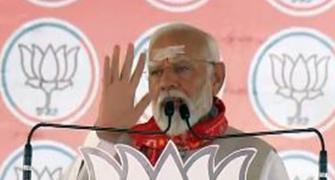'I wonder how we can reduce violence in society by answering it with violence,' asks Shivam Vij. 'If instead we answer it with mercy, we will be a more humane society.'
The cynical Manmohan Singh government has found an easy way to appear strong, deflect attention from its failures, and save itself from the Opposition's questioning.
Just hang a death row convict before every Parliament session!
It is very likely that if the December 16 Delhi rape-and-murder accused are sent to death row by this time next year, the United Progressive Alliance government will hang them just in time for the 2014 general election.
I am opposed to the death penalty in principle, and there are good reasons why so many democracies have abolished the death penalty. But even if you do not agree that the death penalty should be abolished, please consider why it should not be applied to the five accused in this case.
About a month ago I visited the Ravi Das 'camp', a slum colony near R K Puram in New Delhi where four of the six accused in the December 16 Delhi rape-and-murder case lived.
I met the mother of one of them. Champa Devi's son Vinay Sharma was the first to plead guilty and say he should be hanged; his father agreed on television.
I sat with Champa Devi and asked the neighbourhood boys to leave us alone. A group of women, young and old, surrounded Champa Devi and me.
Vinay was the light of the family. He was pursuing a B Com degree, worked at a gym, and waited tables at parties to supplement his income.
The first and most important thing Champa Devi wants me to know is that they are extremely poor. She didn't have to say it, it's visible.
Her family arrived at this slum colony for a better life. Like most slums in Delhi this is hidden from the city's middle class view.
They did get a better life as compared to their village. Her husband is a construction labourer who sells balloons on days when he has no work. At least they were able to give their son and two daughters an education.
Vinay, the eldest child, was their big hope to lift them out of poverty, to help save the money needed to have his two sisters married. One of the sisters suffers from acute diabetes and takes insulin injections daily. You can look at the deformities on her face and tell.
The women of the neighbourhood start speaking, as Champa Devi looks down with shame and sorrow. The women want you to empathise with the mother of a man whom protestors in the city have wanted to be hanged in a public square.
"Look, Ram Singh the driver and his brother Mukesh who also lived here, were bastards," said one of the women. "They never did something like this before, but they were always the bad guys. That evening they persuaded two more from here, Vinay and a fruit-seller, Pawan, to come along for a joy ride. They were unwilling, but Ram and Mukesh persisted."
"They did all kinds of scandals," said Champa Devi about Ram and Mukesh, disagreeing that this was their first such. Of her son, she said, "He was a happy young man. Everything was going right for him. He had just returned from the village where we got him engaged."
"He was such a sweet boy he distributed sweets to all of us," said a neighbour. "He was so looking forward to getting married," said another neighbour.
When the parents met Vinay in jail they said he was full of guilt and shame and wanted to be hanged. "He feels that guilt and admits it only because he was not that sort of a person. He wasn't Ram Singh," Champa Devi said.
"No woman, nobody, ever complained to me even in a dream that my son had harassed a woman. As a woman I was extremely saddened to hear what happened to that girl. I prayed for her to live. I can't believe my son was part of this," she said and started sobbing.
"Even Ram Singh was very nice with all the women in the camp," added a neighbour.
For all their insistence that the men of the area -- including the four accused -- were "always respectful towards women" -- not one of the eight women gathered around said they had not faced domestic violence.
We were then joined by a young woman with books in her hand, preparing for her high school exam, wearing a pair of jeans rather than traditional clothes. "Men do pass lewd comments when I walk to school," she said, "but I ignore them and have never faced a major problem."
The other women now started to debate the issue. "It is not just about men, but also about their parents who should give them the right values and control them," said one.
"Have you seen how women in Delhi wear short skirts and sit so tight with their boyfriends on motorcycles as though they are going to devour them?" asked another.
When pointed out that this was no reason why anyone should rape women, she said, "You should have seen what happened here after the incident. The news TV crews standing here just started staring at a girl with her boyfriend and trained their cameras at them. Men will be men, women should know how not to attract attention."
"Women and men are equally responsible," said one, "The street dog bites you only if you tease it."
When pointed out that this was not the case on December 16 -- the bus was soliciting passengers with the intention of doing what the six men did -- they said it was an aberration.
"Women are bound by brothers, husbands and fathers," said another.
By now we were into a full-fledged debate with everyone speaking together. The women who were blaming women were louder. They suggested that women who make it apparent that they make their own choices in life -- such as wearing Western clothes or being seen with a man they are not married to -- "are asking for it."
"There was a time when young women wouldn't be out even with their brothers lest they be mistaken to be with boyfriends," said one. "But these days..."
The young woman in jeans, now joined by another young woman student, politely disagreed. "Men have to do something about themselves," she said. "Why should boys have all the freedom? Why should they pass lewd comments on the road at a woman who said nothing to them?"
A middle-aged woman, dressed in a traditional sari, supported the young student. "Nobody rapes a man who comes home at 2 am," she said.
"That is how it is," someone replied, "Even if a woman becomes a top bureaucrat in our society she is still seen as a woman."
The middle-aged woman had a solution: All the men should be chained at home and women should go out to earn a wage. I endorsed the idea.
Champa Devi broke her silence at this, taking the joke seriously and disagreeing vehemently. "There is a line between men and women and it should be respected like the India-Pakistan border," she said, raising her eyes towards me, "If you think society should thus be re-ordered why don't you take the lead and change roles with your wife?"
I laughed, and then we all went back to realising the tragedy that has befallen this slum of dreams.
Champa Devi thinks about her son and the thought that his body will be brought dead one day to satisfy the 'collective conscience of the nation'.
She gave him birth and saw him grow like a tree, she said. And to think...
The woman that the six killed was similarly the hope of another set of migrant parents. She too deserved mercy. And she certainly deserves justice. But as I returned home from the Ravi Das slum I kept wondering if the death penalty for these men is really going to do justice to the woman they killed.
That even the women of the neighbourhood share patriarchal ideas about men and women pointed me towards the thought that the 'collective conscience of society' was what produced their barbarism.
Despite the huge public movement against the incident, gang rapes have happened again in this city.
Hanging these six men will not deter rapists who know that this would be an exception, that the conviction in rape cases is going to remain low.
Bus drivers will still be able to commit crimes inside the bus because hanging the five rapists is not going to end the sort of corruption in the Delhi traffic police which lets private buses do what they like on the roads.
The public outcry we have seen against rape should not mean that while so many get away, these five men get hanged. There are others who have committed rape and murder and whose death sentences have been commuted to life.
Why should these five men not get similar mercy? Just because their act attracted public attention?
Hanging the rapists is going to end their lives, and with it their agony. Keeping them in jail is going to effectively end their lives, too, and Champa Devi will have to support her two daughters without Vinay's earnings anyway. But at least she will not have to see her son dead.
I wonder how we can reduce violence in society by answering it with violence. If instead we answer it with mercy, we will be a more humane society, earning mercy in return.
To reduce and prevent sexual crimes, India doesn't need to hang rapists, strangulating them with the drop of a noose.
India instead needs to get its cynical, manipulative and insensitive government implement the excellent Justice J S Verma report.
That will also be the best tribute and the biggest act of justice to the brave woman who inspired the report.





